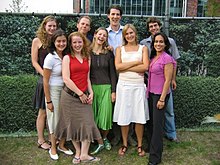User:Bella.wills/sandbox
Public dialogue is a social research methodology which has been used to gather qualitative views on politically relevant topics over the past ten years. It has been used particularly in the UK to inform evidence based policy decisions that are relevant to publics. Formal public dialogue must be research that aims to directly inform a policy decision.

The dialogue process has been led by Sciencewise Expert Resource Centre, a research department funded by the BIS to look ways that public views can be harnessed to inform policy decisions. This method builds on other methods of seeking public views to inform policy decisions by presenting a panel of lay-people with evidence based arguments, seen previously in methods such as Citizens Juries, which have been used to inform policy in Northern Europe, since the beginning of the century.
Public Dialogue draws on the idea that two way communication can inform policy, and often takes the output of a series of focus groups, informed by expert opinion and discussion. An important aspect of dialogue is that the experts and policy makers are informed by the public view, just as the public view is informed by the information provided by experts and policy makers. This two way exchange is hoped to inform policy in a way that is in touch with the needs, hopes and fears of the ordinary citizens that it affects.
Benefits of Dialogue:
- Brings public voice to policy making
- Helps to put experts 'in touch'
- Builds an ethically-centred framework
- Creates buy-in of the public
- Indicates sticking points
- Flags differences of opinion held by different audiences

